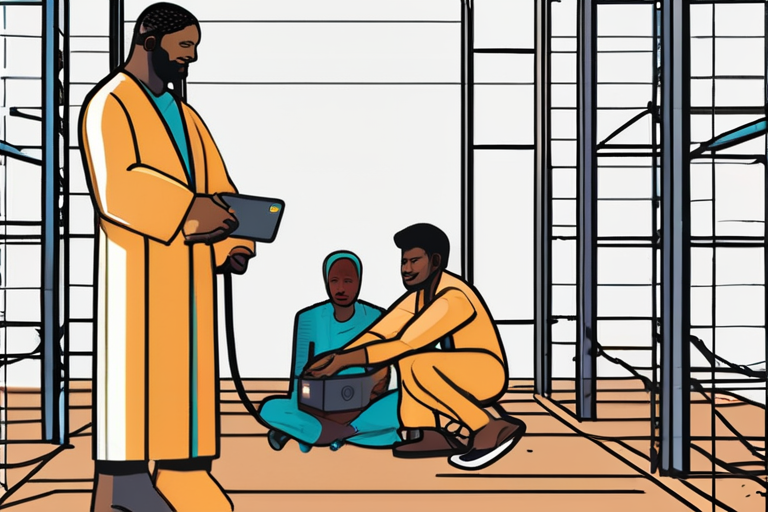Blockchain Rebuilds Trust in Humanitarian Aid
A groundbreaking solution is emerging to address the long-standing issue of transparency and accountability in humanitarian aid delivery: blockchain technology. By leveraging this innovative tool, organizations can ensure that donations reach their intended recipients, rebuild trust with donors, and make a more significant impact on communities in need.
According to Matthew Keller, Impact Lead at the Algorand Foundation, "Blockchain provides an immutable record of transactions, allowing for real-time tracking and verification of aid distribution. This level of transparency is essential in rebuilding trust between humanitarian organizations and their donors."
Keller's assertion is supported by a recent study conducted by the MIT Media Lab, which demonstrated the effectiveness of blockchain in improving aid delivery. The project, known as One Laptop per Child, aimed to provide connected laptops with educational software to children in underserved regions. Keller was part of this initiative and worked closely with General Stanley McChrystal, then Commander of U.S. Armed Forces in Afghanistan.
During their meeting, McChrystal expressed his concern about the lack of transparency in aid delivery, stating, "We lose more than $1 billion a week here." Keller's response, "The cost is not just financial; it's also about trust and accountability," resonated with McChrystal. The two men agreed that an educated population was crucial for building a better future.
The use of blockchain in humanitarian aid delivery has several benefits. Firstly, it ensures that donations are used efficiently and effectively, reducing the risk of corruption and mismanagement. Secondly, it provides real-time tracking and verification, enabling organizations to respond quickly to changing needs on the ground. Finally, it fosters transparency and accountability, rebuilding trust between donors and recipients.
The implications of blockchain in humanitarian aid delivery are far-reaching. As Keller notes, "By leveraging this technology, we can create a more inclusive and equitable system that prioritizes the needs of those who need it most." This shift towards greater transparency and accountability has the potential to revolutionize the way humanitarian organizations operate, ultimately leading to more effective and sustainable solutions.
The use of blockchain in humanitarian aid delivery is still in its early stages. However, several organizations are already exploring this technology to improve their operations. The Algorand Foundation, for instance, is working with various partners to develop a blockchain-based platform for tracking and verifying aid distribution.
As the world continues to grapple with complex humanitarian challenges, the adoption of blockchain technology offers a beacon of hope. By harnessing its potential, we can create a more transparent, accountable, and effective system that prioritizes the needs of those who need it most.
Background:
Humanitarian aid delivery has long been plagued by issues of transparency and accountability. Donors often struggle to track the impact of their donations, leading to mistrust and frustration. Blockchain technology offers a solution to these challenges by providing an immutable record of transactions and enabling real-time tracking and verification.
Additional Perspectives:
Dr. Rachel Kim, a leading expert in humanitarian aid delivery, notes that "Blockchain has the potential to revolutionize the way we deliver aid. By increasing transparency and accountability, we can ensure that donations reach their intended recipients and make a meaningful impact on communities in need."
As the use of blockchain in humanitarian aid delivery continues to grow, it is essential to address the technical and logistical challenges associated with this technology. However, the benefits of increased transparency and accountability far outweigh these challenges, making blockchain an exciting and promising solution for the future of humanitarian aid.
Current Status and Next Developments:
The Algorand Foundation is currently working on several projects that leverage blockchain technology in humanitarian aid delivery. These initiatives aim to develop a more transparent and accountable system that prioritizes the needs of those who need it most. As this technology continues to evolve, we can expect to see significant improvements in the way humanitarian organizations operate, ultimately leading to more effective and sustainable solutions for communities in need.
*Reporting by Forbes.*



 Hoppi
Hoppi

 Hoppi
Hoppi

 Hoppi
Hoppi

 Hoppi
Hoppi

 Hoppi
Hoppi

 Hoppi
Hoppi











